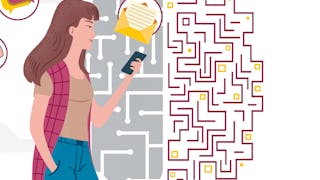Philosophy is like sex: sure you can get some interesting results, but that's not why we do it. Going one step beyond…why do you FEEL pain or pleasure? Do plants have emotions? How is possible that some people do not understand other’s emotions? Emotions seem to be everywhere, giving meaning to all events of our lives. They are the backbone of social activities as well as they drive the cognitive processes of several living entities. Several animals, including humans, have emotions but… what about machines?... Do machine can have emotions?



Emotions: a Philosophical Introduction

Instructor: Jordi Vallverdú
53,276 already enrolled
Included with 
(519 reviews)
Skills you'll gain
Details to know

Add to your LinkedIn profile
13 assignments
See how employees at top companies are mastering in-demand skills


Earn a career certificate
Add this credential to your LinkedIn profile, resume, or CV
Share it on social media and in your performance review

There are 7 modules in this course
Welcome to this amazing course on the nature of emotions. You’ll see that emotions are everywhere. They are the true meaning of our lives and guide us all throughout our daily actions. There is a lot to discuss, to think about, to discover about them! Six modules for a Course, one Course for new Knowledge!
What's included
1 video8 readings
At the very beginning of this course we will look at the basic definitions and concepts related to the emotional events. At the same time we will introduce basic philosophical ideas in order to make possible the understanding of the nature of emotional values.
What's included
5 videos1 reading2 assignments
After the clarification about the different aspects we can find in emotional analysis, we will look at the number and type of different emotions. There are several theories about their number, and all of them also contain a way to understand how emotions emerged and evolved. The debate will be fun!
What's included
5 videos1 reading2 assignments
Not only humans do have emotions. Other mammals have also them. And even insects. But do plants have emotions? Even bacteria, a so small entity, have also these emotional mechanisms. An evolutionary reconstruction will understand to understand how emotions are spread among living entities.
What's included
5 videos1 reading2 assignments
Emotions regulate several key aspects of our life. But they are fundamental for social cohesion. Cooperation or altruism are fundamental aspects of human socialization that must be understood from an emotional perspective. Neurons will show the path to the creation of societies.
What's included
5 videos1 reading2 assignments
There are plenty of historical debates on the nature and role of emotions into philosophical spaces. Usually, this approach is made studying at Western thinkers, but we will also include Eastern ones. Therefore, we will analyse how most important philosophical traditions have understood and explain the role of emotions. [Spoiler: they always said they were BAD!].
What's included
5 videos1 reading2 assignments
At the end of this course we will look on how emotions are displayed into new technological frameworks: social networks, mass media,… but we will think about how emotions are implemented into robots or computers. A new technological era come to us, with the same necessities of all previous ones: emotional. Machines will be emotional, if we want they be really smart, autonomous, and efficient.
What's included
5 videos1 reading3 assignments
Instructor

Offered by
Explore more from Philosophy


University of Alberta


Arizona State University


The University of Edinburgh


Arizona State University
Why people choose Coursera for their career




Learner reviews
519 reviews
- 5 stars
60.88%
- 4 stars
23.12%
- 3 stars
10.01%
- 2 stars
2.89%
- 1 star
3.08%
Showing 3 of 519
Reviewed on Jun 11, 2020
Great Material! Excellent presentation! Very good use of Coursera technology including Avatars and great summaries in End Remarks on the videos. Highly recommend Bob
Reviewed on Jan 11, 2020
Jordi did a great job making such a daunting subject fun and interesting!
Reviewed on Mar 24, 2018
Interesting Course with a lot of information not only from a philosopical perspective but also from different scientific approaches!! Nice and very usefull bibliography !!

Open new doors with Coursera Plus
Unlimited access to 10,000+ world-class courses, hands-on projects, and job-ready certificate programs - all included in your subscription
Advance your career with an online degree
Earn a degree from world-class universities - 100% online
Join over 3,400 global companies that choose Coursera for Business
Upskill your employees to excel in the digital economy
Frequently asked questions
This course is for all of you who would like to know more about Emotions, about how we feel.
No academic bakcground is required to take the course. However, there is a desiderata: to have an open-minded attitude towards new information and ideas.
No, you just need to have an open-minded attitude towards new information and ideas.
No, you will only need a computer, smartphone or tablet to follow the course.
However, if you are interested in obtaining the Course Certificate, you may also need a webcam (if it is not included in your device).
More questions
Financial aid available,

